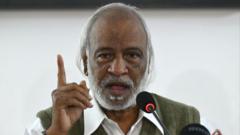Oyo's recent change, requiring proof of marriage from young couples seeking rooms in certain locations, highlights the clash between evolving social norms and traditional Indian values, prompting significant reactions from the youth demographic.
Oyo Revisions Spark Debate on Young Love and Tradition in India

Oyo Revisions Spark Debate on Young Love and Tradition in India
A shift in hotel policy ignites discussions about modern relationships and cultural conservatism.
In a nation where privacy is often a rare commodity, especially for young couples, Oyo—a well-known hotel booking platform—has carved out a niche as a haven for those seeking discretion. Known for a variety of accommodations, Oyo has become synonymous with “love hotels,” providing unmarried couples the opportunity to escape from the prying eyes of neighbors and relatives. However, a recent policy alteration threatens to curtail this space for intimacy.
Revising its operational guidelines, Oyo now enables certain partner hotels, particularly in Meerut, to deny room access to couples unless they can show marriage certificates. This pivot appears to be a strategic response to the grievances expressed by local civil society groups and is said to reflect the prevailing societal sentiments.
Reactions to the new policy have proliferated across social media, leading to a wave of memes and backlash from a predominantly youthful audience. For many young Indians, this development exemplifies the ongoing struggle between enduring traditional values and the quest for personal freedom within the modern context.
With a cultural backdrop where premarital relationships remain heavily stigmatized, especially in conservative sectors of society, such moves are viewed as attempts to suppress evolving relationship dynamics. The traditional construct of marriage, often orchestrated by family arrangements, stands in stark contrast to a burgeoning acceptance of independent, romantic choices, particularly among the nation’s younger generation.
As the debate continues, the stakes remain high—highlighting an essential dialogue about the direction of love, relationships, and privacy in contemporary India.


















